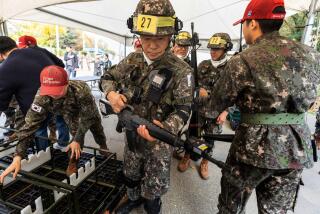Game Boys, Personal Stereos--GI Escapism : Diversions: The high-tech toys are private pleasures, not to be shared. This concerns some officers, who see a pattern of avoidance.
- Share via
WITH U.S. FORCES, Saudi Arabia — In a war that, for American soldiers, seems unlike any other, the distraction of choice is a distinctly trendy device: the pocket-sized video game.
On tanks and in tents, and even in sleeping bags, the combat troops of the ‘90s spend their off-hours glued to Nintendo Game Boys--a bargain, most say, at just $87 at the post exchange.
Snatched from the shelves before soldiers left for the desert, and now devouring thousands of double-A batteries here, near the front, the high-tech Nintendo toys are jealously treasured as a narcotic of sorts. With hard times potentially just ahead with the outbreak of major ground combat, the games are a sure-fire escape from morbid thoughts.
“If they had Game Boys back in Vietnam, the sanity level would have been a lot higher,” insists Cpl. David Murray, a 22-year-old Cheyenne, Wyo., resident and a self-confessed addict of the Nintendo game “Tetris,” in which geometric shapes must be manipulated.
Besides Game Boy, there are other signs in the U.S. camps testifying that--even though war, sand and armor have an eternal sameness--the current Gulf campaign is being waged by some decidedly youthful soldiers from a contemporary, often self-absorbed, video age. Their attitudes and conduct, to a degree, concern their older commanders.
Few troops here arrived for battle without portable Walkman-type personal stereos, ready to provide via headsets reggae, rap or anything else on demand.
And, in a culture in which nonsmoking reigns, the nicotine kick in the field comes as often as not from a can of mint-flavored “dip.”
Private pleasures all, they have in common a self-indulgence that lends to life an intense personal focus, in which the modern soldiers seem determined to avoid introspection.
Explaining why he and his platoon mates have given little thought to what might be in store when the ground war finally begins, Pfc. Kenneth Eversole, 22, of Hyden, Ky., says: “I figure if you thought about it all the time, you’d go crazy.”
Sgt. Miguel Kanavel, a 27-year-old native of Michigan, adds: “You can fill your head full of all kinds of different stuff. But when the battle happens, it’s going to be quick, and then it’s going to be over.”
To be sure, there still are cards and dominoes tournaments--the stuff of soldiers’ lore. There are the timeless bull sessions, and some rediscovery of reading and letter-writing. At times, someone might even attach speakers to a personal stereo. But these are, by and large, the province of the oldest of the young soldiers and of the veteran noncommissioned officers, troops say.
For those such as Pvt. Edgar Uriarte, 19, whose first day of Army basic training was Aug. 2, the day Iraq invaded Kuwait, the favored group pastime is connecting one Nintendo to another for a two-man competition.
“You always try to keep your mind occupied with different things,” says Cpl. Murray, the “Tetris” addict who is a tank commander, explaining the video fanaticism. “When you sit and let your mind drift, then the bad thoughts come.”
In only a month in the desert, many soldiers said they have already mastered all the video games they brought with them, from “Tetris,” the electronic Rubik’s Cube diversion invented by the Soviets, to one called “Follow the Footclan of the Ninja Turtles.”
The escapism of some soldiers has given rise to concern among commanders about an unhelpful pattern of avoidance. “When you’ve got soldiers saying, ‘Hey, let’s get this thing started,’ I think some of them have a distorted view of what war really is,” said a worried Maj. Arnie Leonard, executive officer in a mechanized infantry battalion.
Others described the desert preoccupation with Nintendos, personal stereos and other such devices as a war-intensified product of a generation so accustomed to constant entertainment that, even after long days of training, they feel a need for distraction.
But the video games and cassette recordings “just help us sublimate,” countered Lt. Kirk Delaney, a 26-year-old West Chester University-educated tank platoon leader from Philadelphia.
In an afternoon of conversations, members of Delaney’s platoon, their preparations for war cushioned by the ubiquitous Nintendos and Walkmen, said they feel little in common with those who had preceded them in American battles.
Some bristled at comparisons to Vietnam, where, they insisted, Americans had fought and protested against a jungle war that bore no resemblance to this one. They dismissed the Panama and Grenada invasions as irrelevant and said that World War II, even with its tank battles, seemed remote.
Showing off M1-A1 tanks, which never have been tested in battle but whose training missions have already churned the surrounding desert, the soldiers said it was the lack of a precedent in modern, armored war that made it difficult to imagine what might lie ahead.
Neither movies nor television can provide any sense of what the tank clash might look like, the soldiers complained.
“There’s really no way to envision” modern combat, said Pfc. Eversole, who takes his solace in the pinch of tobacco in his lip and the cassettes that his friends mock as “redneck stuff.” “None of us have ever done it, and even the guys who fought in Vietnam--they haven’t seen it either.”
Whatever their expectations, the huge reinforcement of U.S. soldiers that was shipped in from Germany at Christmas came well-armed for a video-game immersion. About half the soldiers in this platoon said they had Nintendos, a proportion similar to that of other units across the desert.
Officers say the absorption with video games undoubtedly has been encouraged by the strict prohibitions on other wartime diversions. The first general order issued last summer by the U.S. commander, Gen. H. Norman Schwarzkopf, ruled out alcohol and contact with Saudi women, leaving vice-seeking soldiers only tobacco.
And, although the American GI with cigarette dangling from lips is not an uncommon sight, new Army anti-smoking rules have helped to speed a transition that sees perhaps half the soldiers take their tobacco from a can, and the pinch of smokeless “dip” is so much a part of this theater that officers carry cups around with them.
Music--the time-tested bond that long has brought soldiers together in song--is, of course, still the most common distraction. But the near-universality of the personal stereo has made even this a more selfish pastime.
Not only do tents no longer ring with the sound of soldiers in song, as they sometimes did in World War II, but the Vietnam phenomenon of war conducted to music booming from transistor radios is clearly a thing of the past. An armed forces station now beamed through much of the desert provides a palatable patter of ‘60s and ‘70s hits.
More to Read
The biggest entertainment stories
Get our big stories about Hollywood, film, television, music, arts, culture and more right in your inbox as soon as they publish.
You may occasionally receive promotional content from the Los Angeles Times.










